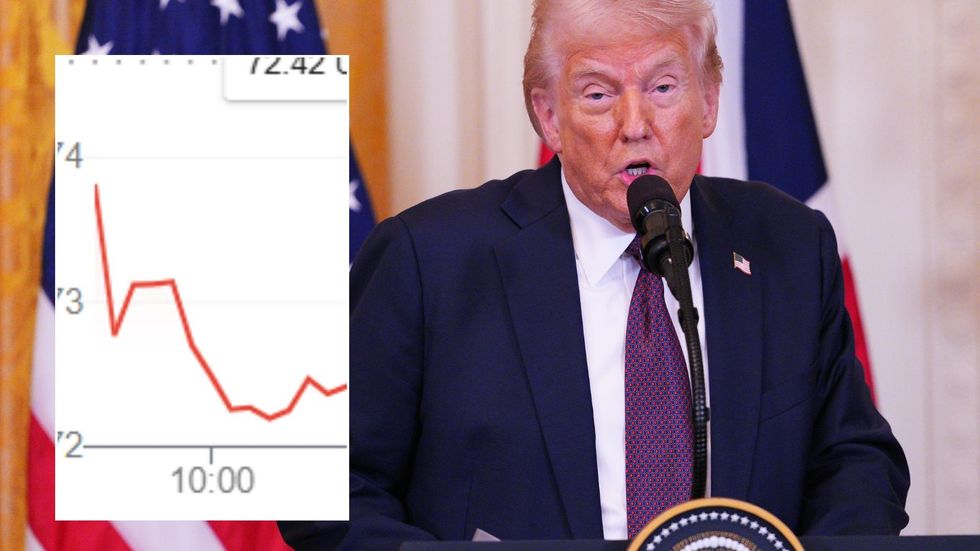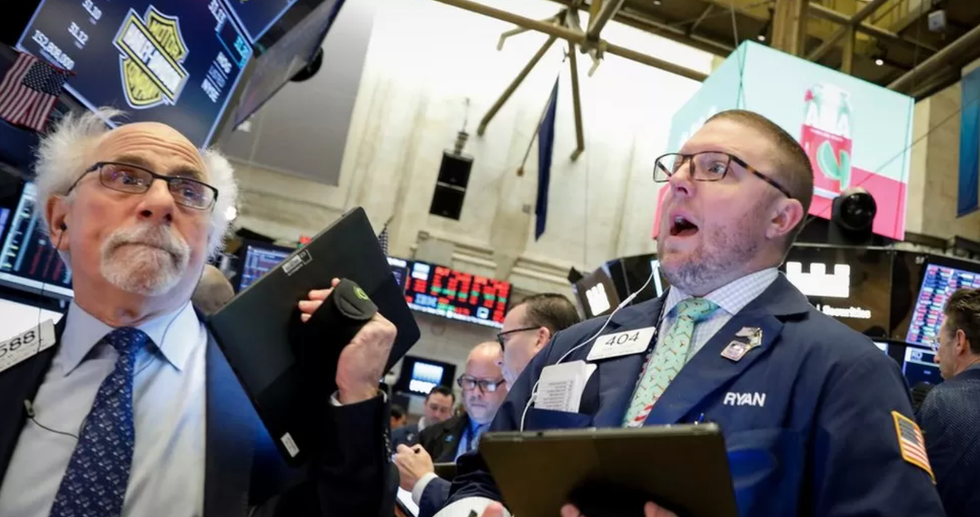‘Abused us terribly!’ Donald Trump targets EU in latest tariff tirade
GB NEWS
President Donald Trump's tariff trade war has investors betting on a recession in 2025
Don't Miss
Most Read
Trending on GB News
The US stock market has taken another hit following President Donald Trump's refusal to rule out a recession.
TThe Dow Jones Industrial Average plunged over 1,107 points, a 2.6 per cent drop, marking its biggest decline of the year.
The S&P 500 fell 3.3 per cent, marking its worst decline in two years. Meanwhile, the Nasdaq Composite led the selloff, tumbling 4.8 per cent, its biggest drop since September 2022.
The S&P 500 is now down 9.1 per cent from its all-time high on February 19, while the Nasdaq Composite has fallen 14 per cent from its recent peak.
Big-name tech companies, known as the "Magnificent Seven"—Alphabet, Amazon, Apple, Meta, Microsoft, Nvidia, and Tesla—all saw losses, driving the broader market decline.
The broad market selloff was largely fueled by fears over President Donald Trump’s tariffs and their potential impact on economic growth.
In a Sunday interview, Trump described the situation as "a period of transition" and did not rule out the possibility of a recession.
Do you have a money story you’d like to share? Get in touch by emailing money@gbnews.uk.

Investors continued to be spooked by the trade war launched by the White House with tariffs of up to 25 per cent hitting Canada, Mexico and China last week.
This has been compounded by Trump delaying tariffs on certain imports that are not complaint with the United States-Mexico-Canada-Agreement until April.
Analysts have cited this perceived backtracking on the White House's key economic policy as causing market volatility.
Over the weekend, Trump was asked if his administration was preparing for a likely recession while appearing on Fox News.
He replied: "I hate to predict things like that. There is a period of transition, because what we’re doing is very big. We’re bringing wealth back to America. That’s a big thing. And there are always periods of, it takes a little time. It takes a little time, but I think it should be great for us."
Some investors worry that the Trump administration's relaxed attitude toward a potential downturn is shaking market confidence. Many had expected Trump's pro-growth policies to boost the economy and markets.
Shelby McFaddin, an investment analyst at Motley Fool Asset Management said: "This is the first time an administration has openly admitted that its policies will cause pain."
Overnight, the yield on two-year US Treasury bonds fell back below four per cent in Asian trading hours following the President's comments.
US Treasury Secretary shared a similar sentiment to Trump during an interview with CNBC on Friday (March 7), citing the administration's goal of US bond yields falling; the benchmark of borrowing costs.
Returns awarded to investors in the short-date bond have fallen sharply over the past month since the White House's trade war began.
LATEST DEVELOPMENTS:
 The stock market has been volatile since Trump returned to office Reuters
The stock market has been volatile since Trump returned to office ReutersTracy Chen, a portfolio manager at Brandywine Global Investment Management, broke down Wall Street's thinking when it comes to the new status quo for US fiscal policy.
David Morrison, a senior market analyst at Trade Nation, added: "It’s difficult to pinpoint the main catalyst for this morning’s sell-off, but there are several possible factors. First up, uncertainty surrounding Trump’s tariffs.
"The President appears to be taking a scatter-gun approach in terms of targets, while teasing the markets with last minute reprieves, delays or softening in scope. All-in-all, it’s proving difficult to price all this in. Federal Reserve Chair Jerome Powell alluded to this in a speech on Friday.
"But he repeated his view that the Fed should remain patient and be in no rush to cut rates further until they had more clarity over inflation and other economic indicators.
Aside from this, there are some concerns over the US economy. Recent data, particularly those numbers which attempt to measure confidence, have deteriorated. There’s also been some mixed jobs data, although Friday’s Non-Farm Payrolls were relatively benign."








